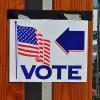Experts Raise Concerns About Elections
City Dope

Photo Credit: Chris Dowd
From left, Deborah Gonzalez, Christopher Bruce, Jeanne Dufort and Linda Lloyd.
A panel of voting rights advocates expressed serious concerns last week on a range of issues relating to elections in Georgia, including local elections here in Athens.
Jesse Evans, one of the panelists and newly elected chairman of the ACC Board of Elections, expressed doubts about his own agency’s commitment to ensuring a smooth 2020 election season. He cast much of the blame on Director of Elections and Voter Registration Charlotte Sosebee, saying that she has consistently resisted his efforts over several years to expand opportunities for people to vote, such as by adding new polling locations. “All the things I’ve been trying to do since I’ve been on the board have been met with resistance,” he said.
Sosebee was criticized for being unprepared for the high turnout of the 2018 midterm elections, which resulted in long lines at the polls for many voters. Evans said he believes there may be similar problems this year. At the panel discussion at Ciné on Jan. 21, he pointed to technical difficulties with the new voting machines that have yet to be overcome and expressed concerns about several polling locations merged years ago due to school construction that have yet to be separated. He worried this will again cause extremely long lines that might be discouraging to voters.
Going further, Evans said he “doesn’t see any evidence” that Sosebee is doing the work needed to overcome these issues. For example, he said he was concerned Sosebee was not preparing a backup plan in case problems with the new voting machines prevented their use. Other Board of Elections members agreed, and they voted 3-2 at a recent meeting to require that Sosebee use paper ballots in case the electronic ballot marking devices failed.
Sosebee told Flagpole she did in fact support the idea of using paper ballots as a backup. However, since a provision for using paper ballots was already in the state elections code, she felt the recent vote was unnecessary. She also felt that it might be misinterpreted as a preference for paper over the ballot marking devices which are required by state law as “plan A.”
Sosebee said at the Board of Elections’ most recent meeting that she will introduce plans this week to “unmerge” four merged precincts and create four new voting sites, so that all 24 local precincts will each have their own voting location for the May 19 primaries. Current voting sites will remain in effect for the Mar. 24 presidential primary.
Regarding the long lines of the 2018 election, Sosebee said she doesn’t expect them to return in 2020, but that she can’t make any guarantees if voter turnout is higher than normal. “I would love to see lines on Election Day, because that tells me people are voting,” she said.
Similarly to Evans, the other panelists had a dire take on the state of democracy and election integrity in Georgia. Jeanne Dufort, a member of the Coalition for Good Governance, warned that the rise of electronic voting machines, which she claims are easily hacked, was “creating a national crisis of confidence” in our elections. She referenced an ongoing federal lawsuit in which a computer security expert recently presented evidence that an election server used in the 2018 election in Georgia was hacked by malicious actors.
Christopher Bruce, political director of the ACLU of Georgia, described his efforts in the current state legislative session to end partisan gerrymandering with an independent redistricting commission. He also stated several times that the ACLU would be available to help the ACC Board of Elections through any potential difficulties to help ensure a smooth and secure 2020 election.
The final panelist was Linda Lloyd, executive director of the Economic Justice Coalition. According to Lloyd, her organization has registered over 18,000 voters in the past two decades. This drew applause from the audience—before she bemoaned the voter purges happening at the secretary of state’s office, saying, “the more we put on, the more they take off.”
The event was organized by the Athens chapter of the American Constitution Society and several other local groups. It followed a screening of the documentary Suppressed about voter suppression in Georgia in 2018, when Democratic candidate Stacey Abrams accused now-Gov. Brian Kemp of using his position as secretary of state to purge voter rolls and make it harder for African Americans to vote. A video of the discussion is available on flagpole.com.












comments